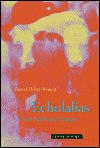 I have a special category to which only some, particularly special, books in my library belong. It's called, "books whose significance I intuit but cannot yet comprehend." Daniel Heller-Roazen's remarkable Echolalias: On the Forgetting of Language (Zone Books, 2005), which I just finished reading, is my latest addition to the category.
I have a special category to which only some, particularly special, books in my library belong. It's called, "books whose significance I intuit but cannot yet comprehend." Daniel Heller-Roazen's remarkable Echolalias: On the Forgetting of Language (Zone Books, 2005), which I just finished reading, is my latest addition to the category.Echolalias is challenging to describe--a bit of a paradox, really. It's among the most erudite books I've encountered, but at the same time, it's also surprisingly readable. Its accessibility stems, I think, from Heller-Roazen's gift at telling poignant stories about language, all of which revolve around the central theme of forgetting. His range is astonishing. Most of the stories he recounts and subsequently develops were rendered originally in Hebrew, Arabic, Aramaic, Latin, French, German, and other non-English languages. (The book itself is in English, a few untranslated passages notwithstanding.) The result is what can only be described as among the most subtle and culturally plural intellectual-historical meditations on the philosophy of language that I can recall.
I'm taken above all by both the idea and phenomenon of an echolalia, which refers to a kind of "babble," stuttering, or blurting out that's prior to language. (The term has particular uptake in relation to individuals with Tourette's Syndrome, many of whom have great difficulty controlling language.) It's precisely this kind of activity, argues Heller-Roazen, that we must forget for language to form, and yet echolalias persist despite language. Think, for example, of all the "uhs," "ums," and other nonsense words that permeate speech that aren't categorically language.
Having read Echolalias, I'm beginning to think of language/speech through the image of walking, which I gather from kinesiologists is basically a controlled fall. Perhaps language is, after all, something of a controlled echolalia, or a strategic reining in of our capacity to produce resonant sound. And like walking, its purpose is to move us forward.
The closest work to which I can compare Echolalias is John Durham Peters' Speaking Into the Air, which similarly investigates the nature of communication by exploring its absolute limits. And whether you liked, loathed, or haven't read Peters' book (it's a masterpiece in my estimation), make sure to pick up Echolalias. You won't be disappointed--though perhaps, like me, you'll take some time to figure out just what's so significant about this elegant book.
1 comment:
Hi Debbie,
Glad to hear it. Because of its somewhat unusual-sounding name, I suspect that Echolalias could end up as one of those books that passes below people's radar. That's part of the reason why I'm publicizing it here--other than its being brilliant, of course. And hey--thanks for reading & commenting on D&R! I've been enjoying your blog, too, and have added it to my list of links.
Post a Comment